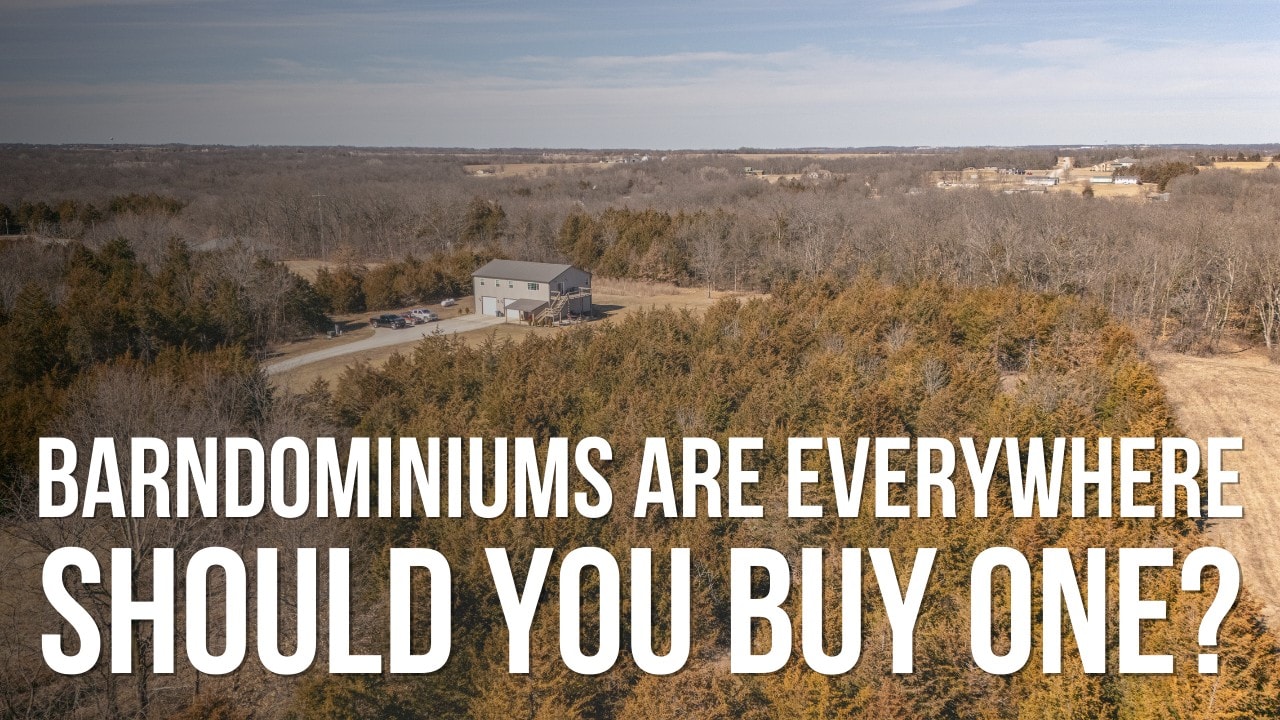Are Shop-Houses and Barndominiums a Smart Investment?

Koby Rickertsen
Land Specialist & Broker
NE, CO, SD, KS, OK, MO, WI, AR, WY
Have you ever thought about having a home that doubles as a workshop, garage, or even a small business space? Shop-houses—also called shouses or barndominiums—are gaining popularity, offering a unique blend of residential and functional space. Are shop-houses and barndominiums a smart investment, or are they a gamble that may not hold their value?
Like any home, quality matters. A professionally built and well-finished shop-house can be a solid investment, while a hastily built DIY version might struggle in the resale market. If you’re considering building or buying a shouse, here’s what you need to know.
What Exactly Is a Shop-House?
A shop-house (shouse) is a home that combines living space with a workshop, garage, or business area—all under one roof. These structures are typically built with metal or post-frame construction, making them durable, cost-effective, and highly customizable.
They’re particularly popular in rural and semi-rural areas, where land is more affordable, and zoning laws tend to be more flexible.
The Pros: Why Shop-Houses Can Be a Great Investment
- Flexible & Multi-Purpose – A shouse is ideal for small business owners, hobbyists, mechanics, or anyone who needs extra space without renting a separate workshop.
- Cost-Effective (If Built Right) – A shouse can be more affordable than a traditional home, especially when using simple designs and cost-efficient materials.
- Energy Efficiency – Many modern shop-houses have high-quality insulation, energy-efficient windows, and low utility costs, which is a big plus in areas with extreme weather.
- Durability (When Professionally Built) – Metal-framed shouses are resistant to fire, pests, and severe weather, making them a long-lasting investment.
- Potential for Appreciation – A well-built and well-maintained shouse in a desirable location can appreciate over time, just like a conventional home.
The Cons: What to Watch Out For
- DIY vs. Professional Construction Affects Value – Poor craftsmanship, cheap materials, or unfinished interiors can seriously hurt resale value. Buyers and lenders will be hesitant to invest in a poorly finished home.
- Financing Can Be a Challenge – Since shouses are non-traditional homes, many banks struggle to appraise them, making mortgage approvals more difficult. It’s essential to find a lender familiar with shop-houses.
- Resale Market Is Still Niche – Not every homebuyer is looking for a home-workshop hybrid, so resale could take longer than selling a traditional house.
- Zoning and Building Regulations Vary – Some areas restrict or limit shop-house construction, which can make financing and resale tricky.
- Customization Costs Add Up – While basic shop-houses are affordable, custom features, high-end finishes, and major modifications can quickly drive up the price.
Professional Build vs. DIY: How It Affects Value
Just like with traditional homes, the way a shop-house is built and finished significantly impacts its value. A professionally constructed, well-finished shouse will generally appreciate over time, while a poorly built DIY version could lose value or be difficult to sell.
Professionally Built & Finished Shouses
- Higher resale value
- Easier to finance and appraise
- Structurally sound with modern safety codes
- More appealing to future buyers
DIY or Poorly Finished Shouses
- Harder to sell and appraise
- Often overlooked by lenders
- More likely to have structural, electrical, or plumbing issues
- Customization choices may not appeal to future buyers
If you’re considering a DIY shop-house, it’s crucial to invest in professional inspections, high-quality materials, and expert craftsmanship. Cutting corners might save money upfront, but it can cost you in resale value down the road.
Do Shop-Houses Hold Their Value?
The short answer: It depends on location, quality, and market demand.
- Location Matters – In rural areas where land is abundant and buyers value workspace, shop-houses tend to hold their value well.
- Build Quality Is Key – A well-constructed, well-finished shouse will retain its value far better than a rushed, low-budget build.
- Market Demand Is Growing – As alternative housing becomes more popular, demand for shop-houses is increasing, which could boost long-term resale value.
One of the biggest challenges is appraisal difficulties—since shouses and barndominiums lack traditional housing comps, lenders and appraisers sometimes undervalue them. However, as more shouses are built and sold, the market will likely become more favorable.
Insurance Considerations for Shop-Houses
Traditional homeowner’s insurance might not be sufficient for a shop-house because it combines residential and commercial or workshop space. Here’s what you need to consider:
- Specialized Policies: Some insurers offer policies specifically designed for shop-houses or barndominiums, which take into account the unique features and risks associated with these structures.
- Adequate Coverage: Ensure your policy covers both the living space and the workshop or business area, including any equipment, tools, or inventory.
- Liability Protection: If you’re operating a business out of your shop-house, you’ll need liability coverage to protect yourself in case of accidents or injuries.
- Building Codes and Permits: Make sure your shop-house meets all local building codes and has the necessary permits to avoid insurance complications.
- Professional Appraisal: A professional appraisal can help determine the correct value of your shop-house for insurance purposes, especially if it has custom features or modifications.
By carefully considering these insurance aspects, you can protect your investment and ensure you have the right coverage for your shop-house.
Final Verdict: A Good Investment—If Done Right
If you need a durable, functional, and cost-effective home, a shop-house or barndominium could be a fantastic investment—especially if you build it professionally and plan to live in it long-term.
However, if resale value is your primary concern, it’s essential to invest in professional construction, high-quality finishes, and a location with strong demand. A well-built shouse will always be a more appealing and valuable investment than a DIY project with questionable craftsmanship.
Do you want to learn more?
Are you interested in tech-driven farmland sales and maximizing your returns? For more questions regarding land real estate, visit our YouTube Knowledge Center or contact a High Point Land Company Agent today.
Koby Rickertsen is an Accredited Land Consultant (ALC), Multi-State Land Broker, and Senior Real Estate Specialist with High Point Land Company. With deep agricultural roots and a disciplined background in the U.S. Navy Submarine Force, Koby applies a data-driven, results-oriented approach to land transactions, ensuring clients maximize their farmland’s value. Reach out to Koby at 308-529-0067 or email Koby@highpointlandcompany.com.
